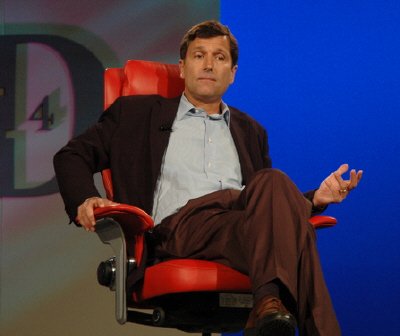D: Comcast's portal ambitions

"People are absolutely committed to getting what they want when they want it," said Steve Burke, president of Comcast, during an interview at D with Kara Swisher. However, unlike Bill Gates who predicted the end of the current broadcast model in about five years, Burke thinks that it will thrive for much longer and has big ambitious to widen the footprint of comcast.net.
The "unicast" model, which potentially would bypass the cable and network distribution mechanisms via the Internet, doesn't make sense for the programmers, Burke said. "The alchemy of the U.S. cable industry started when they paid ESPN affiliate fees. Right now have there are 20 or 30 cable networks that make over $250 million a year and spend on programming."

That business model would fall apart if the programmers weren't paid by the cable and satellite providers, Burke said. "We pay Walt Disney about $1 billion a year. If you ask Bob [Iger, Disney CEO], he is happy to get the payment."The unicast, a la carte model would be a big risk for content companies and the cable companies, Burke admitted. "For cable companies, a la carte is a big risk. It's a completely different business model, but I'm confident we could do fine, but it would be tough for [content] programmers.
That said, if the content should be available at anytime, on any device and personalized, the traditional model will change. It's a question of timing, as Gates suggested.
Networks, such as ABC, who are making programs available via the Internet aren't cannibalizing original airings or radically impacting affiliates. "Fear of Internet bypass is not realistic for us, with 10 million Internet customers growing at 1.5 million per year," Burke added. Comcast is focused on its $99 triple play--TV, Internet and phone--to compete with all the players across the markets. Burke also claimed that Comcast can deliver faster speeds than DSL or satellite services and will do 2 billion video on demand sessions, each averaging 30 minutes, this year.
Burke said that Comcast's IP phone service is going to have significant impact, and the company expects to have 8 to 10 million phone customers in four to five years. "We are trying to get as many customers bundled--email, phone number and video--and then eventually add wireless and other businesses we might go into," Burke said, and wants to become more of a portal for customers. Comcast has a joint venture with Sprint for wireless phone services.
Comcast has big Internet ambitions as well. "You would have to be blind not to see the shift in eyeballs, dollars and consumption," Burke said. "Like everyone else we look at Internet as a gigantic opportunity," Burke said. He plans to secure more video content and extend the footprint of Comcast's portal. "We would like to be the Amazon of video on Internet. We have some assets other companies don't have," Burke said.
He mentioned taking content from shows like "American Idol" that didn't get on the air and making it available online with Web polling and other information, or putting the 90 percent of Olympic coverages that doesn't get viewed online.
The living rooms still seems to be Comcast's sweet spot. "My bet is that for a long time people will want a big fat pipe into home. That doesn't mean you won't have wireless 3G or 4G phones or won't use Wi-Fi," Burke said. "If the world is addicted to more speed and consumption of bytes, I would bet that ten years from now large high definition TVs in the living room as the center and big fat pipe, but there will be a portion who view video on a cell phone."
Comcast, like its many competitors, is increasing its broadband speed, moving from up to 8 and then 10 megabits per second speed. "At a certain point, whether its Wi-Fi or broadband over power lines, we
have a very fat pipe in home that should be superior to wireless, twisted pair or powerline...and we will participate in wireless," Burke said.
Burke also address the Net neutrality issue. He pointed to Comcast's 10 million broadband customers, saying his company has no intention of slowing things down. "Customers will hand you your head," he said. "What scares us in unintended consequences. We want to make sure we have unfettered ability to compete. If the [legislative] language is structured in the right way to deal with unintended consequences we would be alright with that." An unintended consequence would be if the law forbade Comcast to give good video telephone service, he said.
On the issue of speed, Burke said that most customers feel that 6 megabits per second is more than enough, and if customers want 8 or 15 or more megabits per second, Comcast will sell it in tiers. A new feature, Speed Boost, that spikes bandwidth when needed is expected this summer. Still way behind South Korea and other countries....